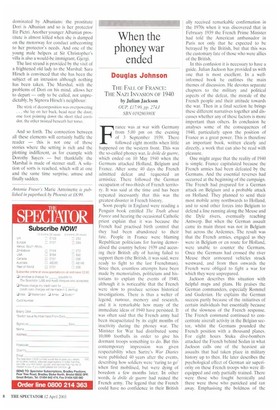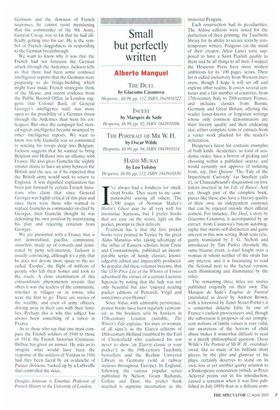When the phoney war ended
Douglas Johnson
THE FALL OF FRANCE: THE NAZI INVASION OF 1940 by Julian Jackson OUP, £17.99, pp. 274,1 SBN 019280300X France was at war with Germany from 5.00 pm on the evening of 3 September 1939. There followed eight months when little happened on the western front. This was the so-called phoney war, la drole de guerre, which ended on 10 May 1940 when the Germans attacked Holland, Belgium and France. After some 40 days the French admitted defeat and requested an armistice. There followed the German occupation of two-thirds of French territory. It was said at the time and has been repeated incessantly that this was the greatest disaster in French history.
Soon people in England were reading a Penguin book entitled The Truth about France and hearing the occasional Catholic priest explain that it was because the French had practised birth control that they had been abandoned to their fate. People in France were blaming Republican politicians for having demoralised the country before 1939 and accusing their British ally of having failed to support them (the British, it was said, were ready to fight to the last Frenchman). Since then, countless attempts have been made by memorialists, politicians and historians to explain the events of 1940, although it is noticeable that the French were slow to produce serious historical investigations. There is thus a welter of legend, rumour, memory and research, and it is remarkable how many of the immediate ideas of 1940 have persisted. It was often said that the French army had been incapacitated by its eight months of inactivity during the phoney war. The Minister for War had distributed some 10,000 footballs in order to give his dormant troops something to do. But this contemporary impression was given respectability when Sartre's War Diaries were published 40 years after the events, describing how soldiers were 'raring to go' when first mobilised, but were dying of boredom a few months later. In other words, la drole de guerre had ruined the French army. The legend that the French could have no confidence in their British
ally received remarkable confirmation in the 1970s when it was discovered that in February 1939 the French Prime Minister had told the American ambassador in Paris not only that he expected to be betrayed by the British, but that this was the customary fate of those who were allies of the British.
In this confusion it is necessary to have a guide. Julian Jackson has provided us with one that is most excellent. In a wellinformed book he outlines the main themes of discussion. He devotes separate chapters to the military and political aspects of the defeat, the morale of the French people and their attitude towards the war. Then in a final section he brings these different narratives together and discusses whether any of these factors is more important than others. In conclusion he analyses some of the consequences of 1940, particularly upon the position of France as a great power. This is therefore an important book, written clearly and directly, a work that can also be read with pleasure.
One might argue that the reality of 1940 is simple. France capitulated because the French armies had been defeated by the Germans. And the essential reverses had occurred at the beginning of the campaign. The French had prepared for a German attack on Belgium and a probable attack on Holland. They planned to send their most mobile army northwards to Holland, and to send other forces into Belgium to defend a line running along the Meuse and the Dyle rivers, eventually reaching Antwerp. But when the German assault came its main thrust was not in Belgium but across the Ardennes. The result was that the French armies, engaged as they were in Belgium or en route for Holland, were unable to counter the Germans. Once the Germans had crossed the river Meuse their armoured vehicles struck westward, and from then onwards the French were obliged to fight a war for which they were unprepared.
Jackson describes this situation with helpful maps and plans. He praises the German commanders, especially Rommel and Guderian. He explains the German success partly because of the initiatives of certain individuals but essentially because of the slowness of the French response. The French command continued to concentrate aircraft activity in the Belgian sector, whilst the Germans pounded the French position with a thousand planes. For eight hours Stuka dive-bombers attacked the French behind Sedan in what Jackson calls one of the heaviest air assaults that had taken place in military history up to then. He later describes the psychological effect of German air superiority on these French troops who were illequipped and only partially trained. There were those who fought heroically and there were those who panicked and ran away. Emphasising the boldness of the
Germans and the slowness of French responses, he cannot resist mentioning that the commander of the 9th Army, General Corap, was so fat that he had difficulty getting into his car, He is the symbol of French sluggishness in responding to the German breakthrough.
We want to know why it was that the French had not foreseen the German attack through the Ardennes. Jackson tells us that there had been some confused intelligence reports that the Germans were preparing to do bridge-building which might have made French strategists think of the Meuse, and recent evidence from the Public Record Office in London suggests that Colonel Bari', of General Georges's intelligence staff, was more open to the possibility of a German thrust through the Ardennes than were his colleagues. But once the campaign had started signals intelligence became swamped by other intelligence reports. We want to know too why Gamelin was so committed to sending his troops deep into Belgium. Jackson suggests that he wanted to bring Belgium and Holland into an alliance with France. He also gives Gamelin the slightly Sinister desire to have an army between the British and the sea, as if he expected that the British army would seek to return to England. A less dignified explanation has been put forward by certain French historians who claim that since General Georges was highly critical of this plan and since there were those who wanted to replace Gamelin as commander-in-chief by Georges, then Gamelin thought he was defending his own position by maintaining his plan and rejecting criticism from Georges.
We are presented with a France that is not demoralised, pacifist, communist, anarchist, made up of cowards and dominated by petty self-interests. Jackson is usually convincing, although it's a pity that he does not devote more space to the socalled 'Exodus', the flight of millions of people who left their homes and took to the roads. A close examination of this extraordinary phenomenon reveals that often it was the leaders of the community, whether in villages or in towns, who were the first to go. There are stories of the wealthy, and even of army officers, driving away in their cars with their families. Perhaps this is why this subject has always been something of a taboo in France.
As to those who say that one must compare the French soldiers of 1940 to those of 1914, the French historian CremieuxBrilhac has given an answer. He asks us to imagine what would have been the response of the soldiers of Verdun in 1916 had they been faced by an avalanche of Panzer divisions, backed up by a Luftwaffe that controlled the skies.



































































 Previous page
Previous page